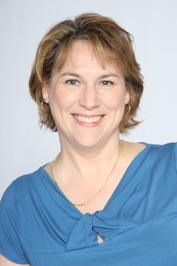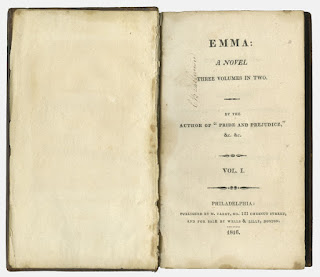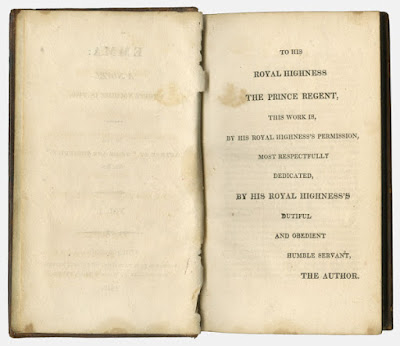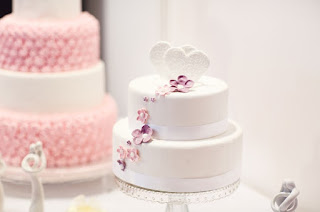The blog tour for Karen's new book will take place next month, including a visit here, but in the meantime Karen has joined us today to talk about Emma. Emma is known for being a heroine that Austen herself described as being "a heroine whom no one but myself will much like" but I've always been very fond of her because her intentions were so good!
I'll now hand over to Karen M Cox for a post about Emma:
Thank you, Ceri, for inviting me here to talk about some interesting tidbits from what some call Jane Austen’s finest literary work, the sparsely titled Emma.
I’m particularly interested in Emma right now for several reasons: The recent 200th anniversary of Jane Austen’s passing has put her in the minds of a lot of the general population, not just ours in “Austen-world”. Also, the novel itself had a relatively recent 200th anniversary; Emma was published in December, 1815. Finally, I’m releasing my own quasi-modern (1970s) variation of Emma next month, entitled I Could Write a Book.
When Jane Austen penned her novel, Emma, she famously declared, ‘“I am going to take a heroine whom no one but myself will much like.” It’s a risk to do that with one’s protagonist, but it’s one that makes Emma still stand out, both as a novel and as a character.
Yes, Emma Woodhouse is different, isn’t she? Described in the first sentence of the novel as “handsome, clever, and rich”, Emma has tremendous advantages compared with Austen’s other heroines. Unlike, let’s say, Fanny Price, Emma remains happily ensconced in her childhood home. Compared to Elizabeth Bennet’s precarious financial situation (or Elinor and Marianne’s), Emma’s economic future is secure—whether she marries or not.
So Emma is a first for Austen in these ways, but this departure from Jane’s other characters is only one of the firsts in Emma, the novel. While researching and writing my upcoming adaptation, I Could Write a Book, I discovered other fascinating Emma tidbits that show what a ground-breaking novel Emma was.
1. Let’s start with the obvious: Emma is the first Austen heroine who is wealthy and has no financial or parental pressure to marry.
The others aren’t so fortunate, and this makes marriage a defining element in their lives. With her 30,000 pound dowry, comparable to Georgiana Darcy’s own marriage portion, Emma can afford to live as she pleases in Highbury.
2. In fact, Emma has the only parent in an Austen novel that actually keeps discouraging the heroine from marrying anyone.
Ah, yes—odd, valetudinary Mr. Woodhouse. He jumps out at us from the beginning pages of the novel.
“His spirits required support. He was a nervous man, easily depressed; fond of everybody that he was used to, and hating to part with them; hating change of every kind. Matrimony, as the origin of change, was always disagreeable; and he was by no means yet reconciled to his own daughter’s marrying, nor could ever speak of her but with compassion, though it had been entirely a match of affection, when he was now obliged to part with Miss Taylor too; and from his habits of gentle selfishness, and of being never able to suppose that other people could feel differently from himself, he was very much disposed to think Miss Taylor had done as sad a thing for herself as for them, and would have been a great deal happier if she had spent all the rest of her life at Hartfield.”Unlike a Mrs. Bennet or a Mrs. Dashwood, Mr. Woodhouse never impresses the importance (or necessity) of marriage on Emma and for this, she is grateful—at least until she discovers her love for Mr. Knightley. Even then, Mr. Woodhouse sort of wins; Emma and her beau decide they will both live at Mr. Woodhouse’s home once they are married.—Jane Austen, Emma, Volume 1, Chapter 1
3. Emma is the only Austen novel with a snowfall—and she uses it to elucidate her characters with almost perfect genius
From “Emma in the Snow”, an essay by Nora Bartlett
“But the snow in Emma is one of those events which provides everyone present with the opportunity to act intensely in character: as John Knightley waxes ever more sardonic, and his wife more passionately and absurdly maternal—“the horror of being blocked up at Randalls, while her children were (a half-mile away) at Hartfield”—Mr. Weston becomes ever more affable and convivial, Mrs. Weston more comforting and kind, Mr. Woodhouse more anxious and nervous, and more dependent on Emma. “What is to be done, my dear Emma? . . . what is to be done?”
But it is the elder Mr. Knightley, who is like his younger brother in “penetration,” but unlike him in forbearance with others’ weakness, whose sterling characteristics jump to life here, as he behaves quickly and calmly—and kindly: and it is so low-key as to be almost invisible.
...Mr. Knightley’s quiet heroism here should not blind us to Emma’s equally strong-minded behavior: both of them act fast, and they act fast together:
Mr. Knightley and Emma settled it in a few brief sentences: thus—
“Your father will not be easy; why do not you go?”
“I am ready, if the others are.”
“Shall I ring the bell?”
“Yes, do.” And the bell was rung. . . .
A frank, intelligent, mutually confiding, mutually reliant exchange: no “he said,” “she said,” on the author’s part, no demurring and no hesitation on the characters’—here, these two are calmly decisive amidst all the confusion; they are co-operating, they are equal. They are both forceful, and tactful—tactfulness, whatever the weather, being the single most important requirement for survival in Highbury.
Are they not made for each other? Though it will take them more than 300 pages, and well into a very hot summer, before they both know it.”
4. Emma is the only Austen novel to mention a piece of music by name
Robin Adair, sung by that Regency era paragon of feminine perfection, Jane Fairfax.
Here’s a 1908 recording, sung by the soprano Geraldine Farrar.
And this one by Hayward and Parsons—cool because it’s sung in front of Chawton Cottage:
5. Emma was the first Jane Austen novel to be published by John Murray.
These snippets are from the Jane Austen in Vermont Blog:
“Her attempts to have Thomas Egerton publish a 2nd edition of Mansfield Park had been unsuccessful the previous year.
‘…it is not yet settled yet whether I do hazard a 2d Edition. We are to see Egerton today, when it will be probably determined. – People are more ready to borrow & praise, than to buy…’ November 30, 1814: (Ltr. 114 to Fanny Knight)
“...Austen submitted her Emma manuscript to the more prestigious John Murray the following year in late summer / early fall 1815
‘Mr. Murray’s Letter is come [dated Oct 15]; he is a Rogue of course, but a civil one. He offers £450 – but wants to have the Copyright of MP & S&S included. It will end in my publishing for myself I dare say. – He sends more praise however than I expected. It is an amusing Letter.’
“...So the decision is made to publish on commission, i.e. Austen takes on the expense of publishing, Murray takes 10% commission on all profits – Austen had learned her lesson in selling the copyright of Pride and Prejudice directly to Thomas Egerton for £110. But those who have looked into all the facts and figures of her profits and losses (see especially Fergus) surmise that she in this case would have done better to have sold the copyrights outright for the £450.”
Source: (https://janeausteninvermont.blog/2015/12/16/the-publishing-history-of-jane-austens-emma/)
6. Emma is the only Austen novel published in America during Austen’s lifetime, although letters do not reveal whether her family or friends knew about this publication
“The 1816 American edition of Emma was the only Austen novel to appear in an American edition during her lifetime (1775-1817). The favorable review of Emma by British author Walter Scott in the Quarterly Review seems to have caught the eye of Philadelphia publisher Mathew Carey (1760-1839). Aside from this apparent impetus, little is known about why and how Carey decided to publish his own American edition of Emma.”
Source: Emma in America website http://www.emmainamerica.org/about-1816-emma
7. Another first —Jane Austen was “told” to dedicate Emma to the Prince Regent
 |
Emma – Prince Regent’s copy (Le Faye) |
‘that the Prince [is] a great admirer of her novels and has read them often and kept a set of in every one of his residences; and he himself thought he ought to inform the Prince that Miss Austen was staying in London, and that the Prince [has] desired Mr Clarke, the librarian of Carlton House, to wait upon her.’ (Memoir 105)We know that Austen visited Carlton House and met with the librarian James Stanier Clarke on Monday the 13th, but there is no account of it from her directly – how one would love to have heard her comments to her sister and Henry when she returned to Hans Place that day!”
Source: (https://janeausteninvermont.blog/2015/12/16/the-publishing-history-of-jane-austens-emma/)
8. Emma is the only Austen novel where a coachman attains something like the status of a character
James, no ordinary coachman, appears eighteen times in Emma, giving him a status that I’m sure the other Austen servant characters envy. Compare this to, say, poor Mrs. Hill in Pride and Prejudice, who merits only seven mentions. James has no dialog, mind you, but he seems to actually have some personality—ascribed to him, of course, by Emma and Mr. Woodhouse.
9. And last, but not least, Emma is the only Austen novel in which wedding cake is served.
But don’t get too excited about the cake. It’s not what you’re probably thinking, which is something like this:
But instead, it most likely looked sort of like this...with icing...and soaked in rum:
No wonder Mr. Woodhouse was worried about serving “rich” cake at Miss Taylor’s wedding!
Are you aware of any other firsts regarding Jane Austen’s masterpiece novel, Emma?
* * *
I Could Write a Book Book Description“Emma Woodhouse, handsome, clever and rich…”
Thus began Jane Austen’s classic, a light and lively tale set in an English village two hundred years ago. Yet every era has its share of Emmas: young women trying to find themselves in their own corners of the world.
I Could Write a Book is the story of a self-proclaimed modern woman: Emma Katherine Woodhouse, a 1970s co-ed whose life is pleasant, ordered, and predictable, if a bit confining.
Her friend George Knightley is a man of the world who’s come home to fulfill his destiny: run his father’s thriving law practice and oversee the sprawling Donwell Farms, his family legacy in Central Kentucky horse country.
Since childhood, George’s and Emma’s lives have meshed and separated time and again. But now they’re adults with grown-up challenges and obligations. As Emma orchestrates life in quaint Highbury, George becomes less amused with her antics and struggles with a growing attraction to the young woman she’s become.
Rich with humor, poignancy, and the camaraderie of life in a small, Southern town, I Could Write a Book is a coming of age romance with side helpings of self-discovery, friendship, and finding true love in the most unlikely places.
About the Author
 Karen M Cox is an award-winning author of novels accented with romance and history, including 1932, Find Wonder in All Things, and Undeceived. She also contributed a short story, “Northanger Revisited 2015”, to the anthology, Sun-Kissed: Effusions of Summer, and a story titled, “I, Darcy” to The Darcy Monologues. The Journey Home, an ebook novella companion piece to 1932, is now available.
Karen M Cox is an award-winning author of novels accented with romance and history, including 1932, Find Wonder in All Things, and Undeceived. She also contributed a short story, “Northanger Revisited 2015”, to the anthology, Sun-Kissed: Effusions of Summer, and a story titled, “I, Darcy” to The Darcy Monologues. The Journey Home, an ebook novella companion piece to 1932, is now available. Karen was born in Everett WA, which was the result of coming into the world as the daughter of a United States Air Force Officer. She had a nomadic childhood, with stints in North Dakota, Tennessee and New York State before finally settling in her family’s home state of Kentucky at the age of eleven. She lives in a quiet little town with her husband, where she works as a pediatric speech pathologist, encourages her children, and spoils her granddaughter.
Channeling Jane Austen’s Emma, Karen has let a plethora of interests lead her to begin many hobbies and projects she doesn’t quite finish, but she aspires to be a great reader and an excellent walker—like Elizabeth Bennet.
Connect with Karen:
• Website • Amazon Author Page • Facebook • Twitter • Pinterest • Instagram • Tumblr •





Gosh! All the firsts associated with Emma!
ReplyDeleteNever realised or thoughts about this facet of her book.
Many thanks for such an informative post!
Looking forward to reading ICWAB. Best of luck with it,Karen.
Thanks, Mary! Yes, a lot of interesting factoids about "Emma".
DeleteThanks Mary, glad you enjoyed the post.
DeleteThanks for hosting Ceri. I just loved this post and thanks for the recordings of the song. How awesome. I can't wait to read this story, especially since it is located in KY. Go Cats... or Cards... your preference. Karen... blessings on the success of this work.
ReplyDeleteI have one child who went to each school - UK and UofL! I Could Write a Book's Emma does go to a UK basketball game, which you'll appreciate :)
DeleteThanks Jeanne. I hope you enjoy the book when you read it.
DeleteI just adore this post because not only do I love "Emma," I love learning about how this book was special for Jane Austen in quite a few ways. I think readers will love spending time in Highbury with Karen's characters.
ReplyDeleteThanks for sharing this post, Ceri. I know how much you love "Emma" and I hope this book resonates with you too.
Thanks for stopping by, Claudine!
DeleteThanks Claudine. I am very fond of Emma and really looking forward to reading this book. :)
DeleteWell I learned alot of 'new' things about Emma/Jane that I didn't know! Thank you! I also loved the singing of 'Robin Adair' by Hayward and Parsons! Congratulations!
ReplyDeleteI know - I thought that Hayward and Parson clip in front of Chawton Cottage was so cool!
DeleteGlad you enjoyed the post Carole!
DeleteSo many remarkable firsts! But your information about the cake--I never thought of the cake like that. Interesting indeed.
ReplyDeleteYeah, I'm not a fruitcake fan, so modern wedding cakes seem like a vast improvement to me! :)
DeleteI wasn't surprised about the cake Christina, fruitcake is very common here in the UK. And I am very fond of it!
DeleteI learned lots of cool things, here, Karen. As a Yank, the fact that Emma was published in America during her lifetime, is really the coolest to me. Can't wait to read your modern Emma. :)
ReplyDeleteThat trivia was new to me - I never really thought about it much, assuming that Austen was always available everywhere, like our own times. Thanks for stopping in to say hi, Sophia!
DeleteI think from what I've read that Austen never saw a penny of the US editions. So basically it was pirated. I am glad her genius spread abroad but so sorry that Austen never benefited financially
DeleteHaving recently re-read Emma (in the annotated David Shapard edition) whilst listening to Juliet Stephenson's wonderful narration, I'm all anticipation for your new book, Karen. Thanks for sharing this list of "firsts and onlys" with us. There's some fascinating information there.
ReplyDeleteThe 70s were definitely a coming of age time for me. The first half of the decade marked the second half of my teenage years. I left home, went to University, graduated, got married and spent two years living and working in West Africa in that time. Indeed, when it comes to wedding cake, ours was very much like your second picture - a rich fruit cake covered in icing, made by my husband's grandmother. Mr Woodhouse definitely would NOT have approved!
I have Shapard's "Emma" by my bedside - lol - but I have not listened to Juliet Stevenson's narration. Another item on the "must-have" list! Thanks :)
DeleteI had a fruitcake for my wedding cake too, Anji. In my mother's day they would save the top tier for the christening, but I gave my top tier to her to take to work to share with her colleagues. Like you, my wedding cake was a fruitcake. I think that type of cake is still quite common here in the UK as it keeps so well.
DeleteI'm probably nearer your mother's generation than yours Ceri, and I can confirm that tradition. I think most wedding cakes were of the rich fruit type back then and it was still expected that children would follow fairly soon after the wedding. In fact, I remember an elderly friend of the family asking us how many children (plural) we had (we'd been married for six years) and she was totally shocked when we told her we hadn't had any yet. In fact, it was eventually fifteen, but that's another story!
DeleteNowadays, of course, it's the norm for women to carry on working for a number of years before starting a family so even a rich fruit wedding cake wouldn't keep long enough to be used at a christening.
I would say it's only in recent years that you would see wedding cake that wasn't iced fruitcake here in the UK. I got married in 2001 and there was the option to have the top layer as sponge but the rest fruitcake as it was a tiered cake.
DeleteThis comment has been removed by the author.
ReplyDeleteSuch interesting snippets of info related to the release of Emma! I knew only a couple of them before reading this blog entry. I actually WAS a co-ed living at home while going to college in the 1970s, so I suspect I'm really going to relate to this interpretation of Emma Woodhouse. I remember thinking I had a good understanding of the world-- until I graduated, moved from home, and got out in it. Then I realized how wrong I was!! I have the feeling Miss Woodhouse may have a similar experience...
ReplyDeleteSince you're in a similar cohort, I'm so excited for you to read ICWaB, Debbie! Thanks for your comment :)
DeleteSounds like this book might be close to home for you, Debbie! I think that Emma is so typical of the arrogance of youth.. you think you know it all until you realise that you don't!
DeleteSo much interesting information...thanks for sharing. I look forward to your publication.
ReplyDelete